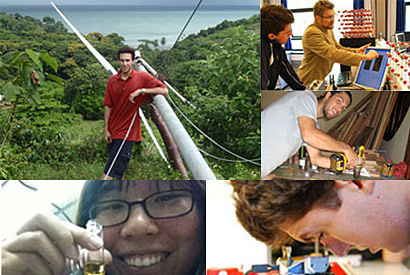Cal Energy Corps interns prep for sustainable future
Some 32 Berkeley undergraduates will spend up to 12 weeks working on sustainability projects in the Bay Area and across nine far-flung countries.
April 24, 2012
Brimming with nervous excitement at adventures and discoveries to come, the newest cohort of Cal Energy Corps interns gathered for pre-departure orientation Monday before fanning out across the globe this summer to work on myriad sustainability projects.
Launched in 2011, the Cal Energy Corps initiative provides research- and experiential-learning internship opportunities through project placements with partner organizations tackling alternative energy, climate change and sustainability issues. It is modeled after the U.S. Peace Corps, which celebrated its 50th anniversary in 2011.
“Our students are very idealistic and want to make a difference in the world,” said Graham Fleming, Berkeley’s vice chancellor for research, whose office administers the program. “This program gives them the opportunity to work with talented people on practical projects to solve real-world problems.”
Building on last year’s success — the pilot initiative supported 19 interns — Cal Energy Corps organizers selected 32 Berkeley undergraduates for the 2012 program. Although several students will remain in the Bay Area, with placements at Imprint Energy and Lawrence Berkeley National Laboratory, most interns will head to one of nine countries around the world, including Brazil, China, Germany, Ghana and India.
“Our goal is to help our undergraduates understand that sustainability spans a complex set of interlocking problems — energy, water, air — that are global in nature but that demand situation- and region-specific solutions,” Fleming said.

In 2011, the first cohort of Cal Energy Corps interns worked on sustainability projects in North America, Denmark, Hong Kong, India, Nicaragua and Taiwan.
Interns will work on a broad range of projects, from developing new materials for batteries and wind turbines to testing energy-efficient cooking stoves and improving agricultural-crop characteristics. Other projects focus on biofuels, carbon capture, microbial and hydrogen fuel cells, solar-powered latrines and the conversion of waste into energy.
The program covers students’ travel and housing costs and offers a $600 weekly stipend throughout the eight-to-12-week internships, which begin mid-May. Placements are full-time with students working roughly 40 hours per week to help project teams develop and deploy sustainable solutions to energy and resource challenges.
Hank Fanchiu, a 2011 program participant, was on hand at Monday’s orientation to offer insights, tips and a touch of reassurance to the latest crop of interns. Last summer, the sophomore traveled to Lyngby, Denmark, where he joined a university research project designing cheaper and more efficient catalysts to improve renewable energy technologies, such as solar, wind and biomass.
“Being part of this program really broadened my academic focus and possible career paths,” said Fanchiu, a double major in molecular and cell biology and psychology. “The researchers taught us how to use all this great, high-tech equipment — including an electron microscope that is one of only five in the world — then gave us assignments and let us get to work.”
Fellow 2011 program veteran and graduating senior Ching Ching Liu spent her internship at the Indian Institute of Technology Kharagpur in West Bengal.
2011 Cal Energy Corps symposium
“Learning to interact with people from different cultures and do things in different ways was a great learning experience that I will take with me as I go out into the world, braver and more confident than before,” said Liu, a civil engineering major.
After they return to Berkeley, participants will put together poster presentations that showcase specific projects and internship experiences as part of a special Cal Energy Corps symposium. Last year, many of the interns shared their program, project and personal experiences from the field, posting periodic updates to the Cal Energy Corps blog.